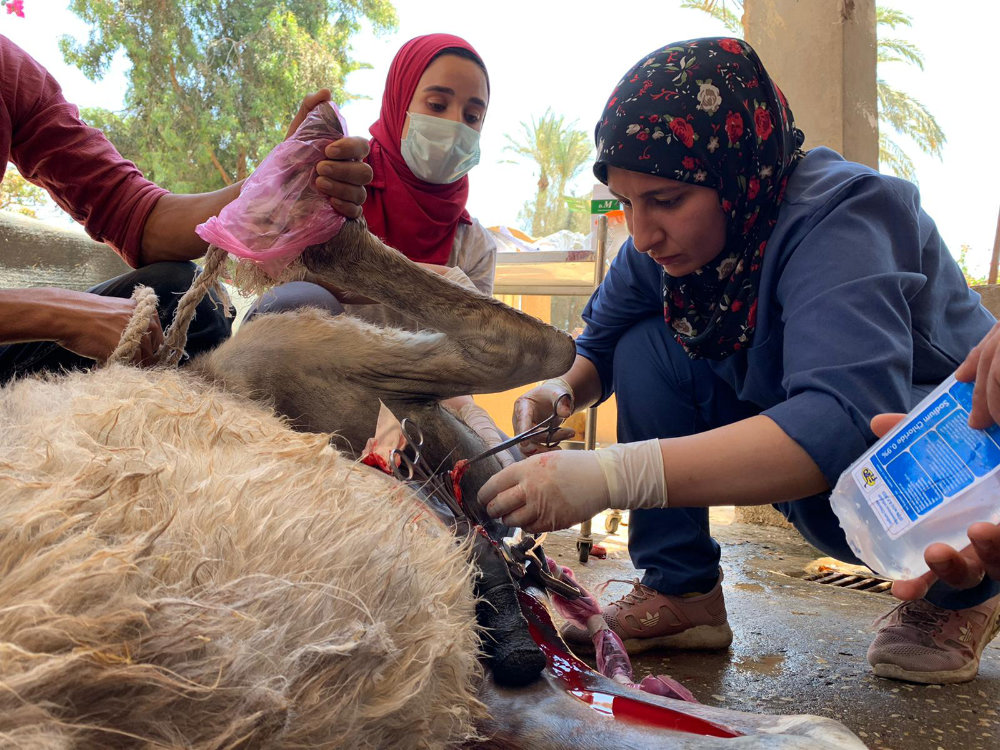CAIRO: When Jill Barton and her husband first came to Cairo seven years ago to volunteer at a horse and donkey sanctuary, they had little inkling they would end up moving to Egypt permanently to care for rescued animals.
Originally from Australia, Barton and her husband Warren share a great love of horses. It is perhaps no surprise, then, that during a visit to Egypt in December 2013, the couple were moved by the suffering of the local horses and donkeys put to work in deprived rural areas.
The owners of these animals often cannot afford veterinary care, nor do they have the luxury of giving the animals time off to recover.
There are an estimated three million working horses and donkeys in Egypt used for transport, agriculture and tourism. According to Barton, many of them are the descendants of Australian “war horses” left behind after the First World War.
In mid-2014, Barton and her husband sold up their family home in Australia and almost all of their possessions before moving to Abu Sir on the outskirts of Cairo. They rented a property with nearby stables in close proximity to the region's famous archaeological sites, where horseback riding is popular.

Abused horses and donkeys in Egypt find a champion in Egypt Equine Aid. (Supplied)
There, the couple established Egypt Equine Aid (EEA), a non-profit organization that rescues horses, donkeys and mules from maltreatment and gives them a better life. Horses and donkeys are particularly vulnerable to abuse, often overworked and with few facilities to guard their welfare.
“Treating sick animals at the local farms has a strong impact on the family businesses and animal welfare,” said Muriel Sacks, EEA’s veterinary technical director, who is originally from Switzerland.
EEA provides medical treatment to sick and injured animals on a non-profit basis. Arrangements are available for finding a new home (rehoming) for animals whose owners can no longer look after them. EEA also provides training for veterinarians and schemes for local workers in farriery (equine hoof care), medical care and equestrian skills.
“Local owners of donkeys and horses are shown how to treat, feed and work their (helpers) in the most sustainable way to keep them strong and healthy,” Sacks said.
The organization currently employs four veterinarians, four assistants and eight support staff, including grooms and administrators. It also has its own farrier team, trained by EEA, to work in the community.
FASTFACT
Egypt Equine Aid (EEA) rescues horses, donkeys and mules from maltreatment and gives them a better life.
“By offering jobs and education, we provide young men and women of the local community with an opportunity to have a reliable salary and strengthen the workforce,” Sacks said.
While initially self-funded, EEA has since received grants from the Australian Embassy in Cairo and is recognized among an international community of supporters and horse-lovers who send donations.
“We rely on our social media pages and other media to spread the word about our work,” Sacks said.
Now Barton and her team are looking to expand the reach of their project. Their future plans include increasing the capacity of the existing hospital to treat more animals.
In the mid- to long-term, they look forward to building a whole new hospital and fitting it with advanced technologies for specialist diagnostics, prolonged general anesthetics (medications that cause anesthesia) and more complex surgical procedures.
• This report is being published by Arab News as a partner of the Middle East Exchange, which was launched by the Mohammed bin Rashid Al Maktoum Global Initiatives to reflect the vision of the UAE prime minister and ruler of Dubai to explore the possibility of changing the status of the Arab region.













